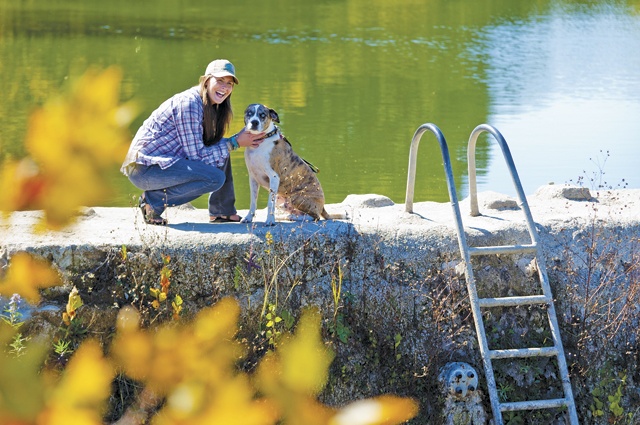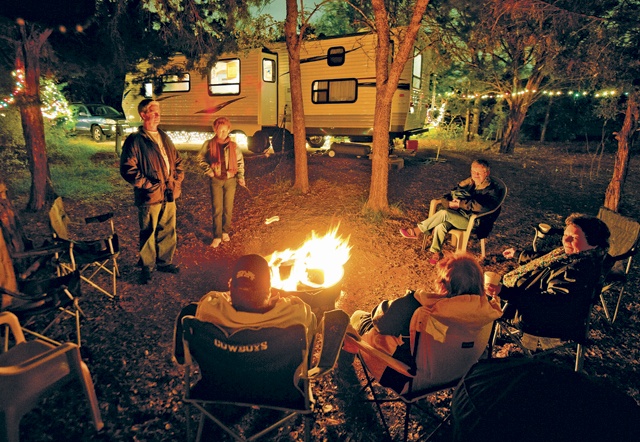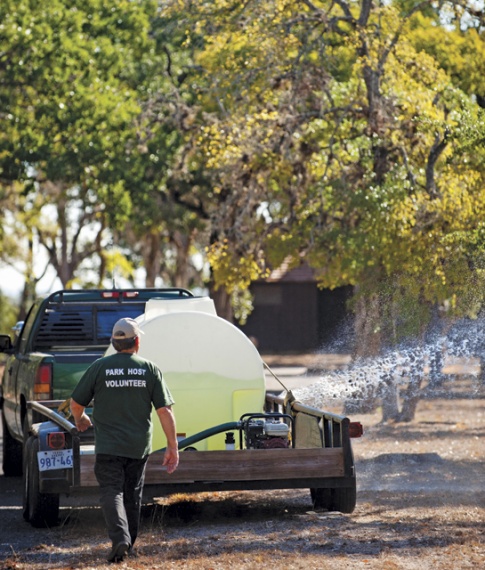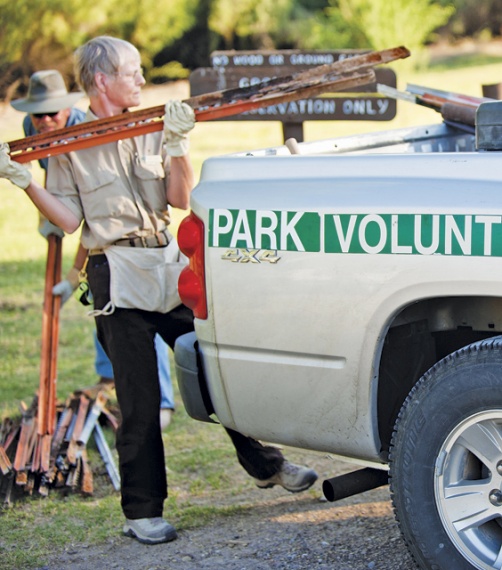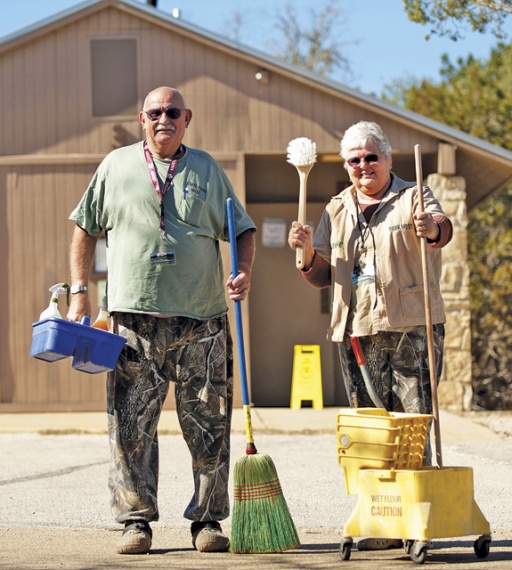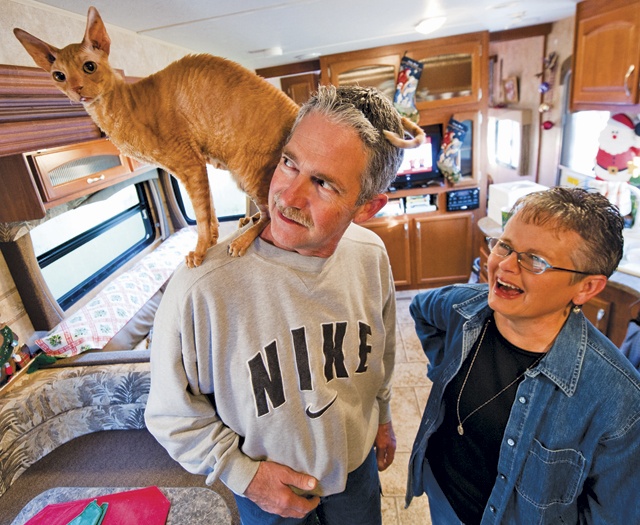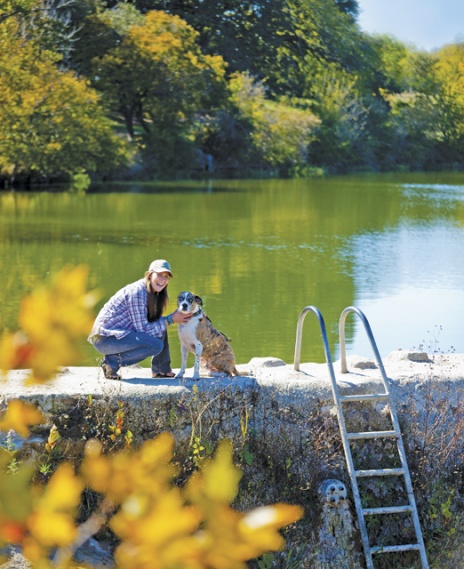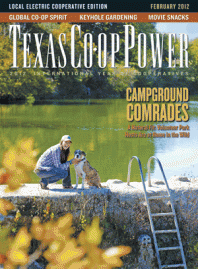They live on public lands. They often roam the country, moving from place to place. And they always bring their own shelter with them.
They’re the people who live in recreational vehicles on-site at state and national parks, wildlife refuges and public wilderness areas, including more than 100 locations across Texas.
In exchange for utility services—such as free electricity and water and sewer hookups—these resident volunteers (officially called “hosts” at state parks and “volunteers-in-parks” at national parks) work part time, usually 20 to 30 hours a week.
Depending on the location, the uniformed volunteers perform any number of chores: cleaning restrooms, patrolling grounds, mowing grass, painting signs, managing campgrounds, maintaining facilities, enforcing rules, giving tours and operating the front desk. The arrangement seems a perfect example of economic efficiency, matching a demand for inexpensive labor at cash-strapped parks with a supply of footloose volunteers—without any money changing hands.
It’s easy to see what recreation managers get out of this deal at a time of near-universal cuts in park operating budgets. “We’d have to shut our doors,” if not for the services of volunteers, says Lori Reiley, volunteer coordinator for the Texas Parks and Wildlife Department.
But what about the people who serve as park hosts? I was interested in learning the stories of these itinerant volunteers: What motivates them to pack up and live in a park campground for several months at a time—or longer?
In interviews with a score of volunteers and park officials, I found that, yes, many park hosts fit into a similar box: They are mostly retired couples in their 60s and 70s (occasionally 50s or 80s) who love the outdoors, enjoy working with people and would rather stay busy than idle the hours away.
But I found exceptions, including single people who are going through a life transition, such as the death of a spouse or a divorce. And, the motivations of the park volunteers are seldom identical, just as no two parks are.
While bunches of camp hosts are full-timers—having sold their homes for life on the road—many seek the best of both worlds by volunteering only a portion of the year and returning to their homes at other times.
Serving as They Go
La Verne and Harold Soefje fit this profile. I met the part-time hosts at Pedernales Falls State Park, a scenic Hill Country site about an hour’s drive west of Austin (and served by Pedernales Electric Cooperative). Their kids grown, their house in Cameron paid off, the Soefjes began hosting after they both retired in 2007. Veteran campers, they long ago upgraded from a tent to a succession of ever-more-fancy recreational vehicles, culminating in their 34-foot fifth-wheel RV. They’ve served as hosts at half a dozen state parks—from the alligator habitat of Brazos Bend near the Gulf Coast to the woodsy Purtis Creek in Northeast Texas. In 2010, they traveled to South Dakota to volunteer at a recreation area in the Black Hills.
“That’s what we can do, see different parts of the country and still be of service,” says La Verne, who served as Milam County clerk, an elected position, before she retired.
We sit at a picnic table covered by a red-and-white checked oilcloth under the shade of a canopy adjacent to their RV. Laundry hangs from a nearby clothesline, birds dart around and enjoy seeds from their feeders, and Harold rises occasionally to sell bags of ice to campers.
“I like the outdoors and talking to people and helping people,” says Harold, a former volunteer firefighter.
Like many hosts, the Soefjes have made lifelong friends on the road, and they keep up with them via email, Facebook postings and cellphone calls.
In for the Long Haul
While the Soefjes return to their home in Cameron for stretches, most of the 16 volunteers at Cedar Hill State Park are full-time residents there. Cedar Hill, a 30-minute drive southwest of Dallas, relies on hosts more than any other state park, says Mercy McBrayer, a volunteer coordinator for Texas state parks. And, many serve long-term stints, meaning they are granted waivers to stay longer than three months—the typical maximum stay that state parks allow. The hosts are re-evaluated every quarter. Among the rules: Keep their sites from looking as if they’ve taken up permanent residence. “We want this to look like a campsite, not a trailer park,” McBrayer says during a tour of the busy park.
Jeanie and Dean Pennington moved to Cedar Hill nearly four years ago. Officially, Jeanie is the volunteer while Dean continues working as a truck driver. “In two years, when my husband retires, we plan to travel and see the country,” says Jeanie, a former Walmart store manager who works the park entrance gate and organizes geocaching activities, a kind of high-tech treasure hunt involving global positioning devices.
Other hosts include Sue Krider, who moved to the park a decade ago when her husband became a host. After he died of cancer in 2006, Sue stayed to host. She has weathered other heartaches: She lost her possessions when her previous RV burned up in a fire, and even lost her beloved schnauzer when the dog was attacked by a coyote. But she has no intention of moving. “This is where all my friends are,” she says.
The Woods—Danny, 55, and Sandy, 54—moved to the park in March. While they shined with an obvious joy for their decision to retire early and sell their home in a nearby suburb, they admit the lifestyle isn’t for everyone. It works for them because they possess three ingredients they say are necessary: They love the outdoors, they were willing to downsize and they adore spending time together. And, with their backyard a state park filled with songbirds, deer and other wildlife, “I think I’ve died and gone to heaven,” says Danny.
Call of the Road
While Cedar Hill hosts mostly stay put, many full-timers cut the tether completely. Among them: Gary and Diane Frable, who lived in the Philadelphia area all their lives before they became nationwide park hosts in 2002.
They had long loved camping and dreamed of really seeing the country, but how to do it on someone else’s nickel? Doing research, they learned about park hosting and “workamper” jobs at private campgrounds. They soaked up information from RV dealers and full-timers and attended a “Life on Wheels” class at a community college.
They made the leap after they sold their home and a successful office-supply business. They’ve since lived everywhere, from Oregon to Michigan to Florida in some of the nation’s most beautiful places: Yellowstone, the Grand Tetons and Theodore Roosevelt national parks, and Pea Island (Outer Banks of North Carolina) and J.N. “Ding” Darling (Sanibel Island, Florida) national wildlife refuges.
Along the way, Gary and/or Diane have dressed in period costumes, learned to attach radio collars to bobcats caught in box cages, participated in wildlife studies, trained as a heavy-equipment operator and given interpretative tours as they drove a 68-person tram at Santa Ana National Wildlife Refuge in the lower Rio Grande Valley. They’ve rappelled down a 70-foot-high cliff, watched a black bear lumbering through camp and marveled at Sandhill Cranes doing their mating dance. Last September, they returned for another stint at Big Bend National Park to work back-country patrol. In prior years, they ran canoe trips through Santa Elena Canyon along the Rio Grande.
The Frables now work exclusively at public parks after spending grueling months at a privately owned campground in New England. Some private camp operators think they are doing you a favor by scheduling you for extra (paid) work. “They can’t quite grasp that I wasn’t interested in making more money,” Gary Frable says. “I was interested in enjoying myself, and if I wanted to work 40, 50, 60 hours a week, I would have stayed in my business.”
Despite some pitfalls, people discover the romance of the road and this kind of life, though outsiders often have a hard time getting their heads around it. Frable recalls a typical exchange last summer with a retired Houston man who parked his RV in an adjacent space at a campground in Colorado.
“Where do you live?” the man asked.
“Right there,” Frable said, pointing to his RV.
“Don’t you have a house?” the man asked, incredulously.
“Yes, right there.”
“Where do you keep your stuff?” the man continued.
“In my home,” Frable said, “which is right there.”
The conversation continued as Frable answered usual questions: how about doctor visits, getting mail and paying taxes? (They go to local doctors wherever they are, use a mail-forwarding service based in Livingston that caters to full-time RVers and, thus, are considered Texans for tax purposes.)
Healing Hiatus
The appeal of the nontraditional is sometimes linked to a life-changing event or a change in priorities. Tom Langham, a retired state chemist who lives in Austin, became a park host out of grief. In January 2011, his wife died suddenly of cancer. By July, he had moved temporarily to the quiet of Pedernales Falls. On off days, he is close enough to return to check on his home in the city and visit his aging mother. He has decorated the inside of his motor home with happy photos of his wife and himself traveling the nation’s back roads and visiting national parks in years past.
Chrissy Long, 31, decided to serve as park host at Blanco State Park (served by Pedernales Electric Cooperative) to trim costs and return to Texas State University in San Marcos to complete her bachelor’s degree. Years earlier, she had dropped out of college one semester short of graduating, and in the ensuing years, married and worked long hours as a restaurant manager in Austin.
But after her marriage failed, she entered a period of soul searching. While on a prayerful hike in a wilderness preserve in New Mexico, she dreamed up her plan. Her application was approved to serve as a park host in August and September, sweltering months when the Blanco park is often short of volunteers, says Mary Alice Partain, the park’s volunteer coordinator.
Long lives in a 19-foot trailer she borrowed from an uncle. Her trailer is parked next to the eight-ton fifth-wheel owned by the Bells—Alton, 81, and Anne, 78—who have worked as hosts for more than a decade.
When not attending classes or studying, Long patrols campgrounds and cleans restrooms. “I like the solitude and the flexible schedule,” she says. “It couldn’t be more ideal.”
Social Status Disappears
Living in the midst of wildlife and with a constant flow of campers, the work is seldom routine.
On the same day I was visiting Pedernales Falls and Blanco parks, two couples serving as park hosts at Bastrop State Park (served by Bluebonnet Electric Cooperative) were being evacuated as a wildfire swept through the park’s pine forest. It became the most destructive fire in Texas history, ravaging parkland and destroying more than 1,600 homes and 34,000 acres in Bastrop County.
A couple of weeks later, I caught up with two sets of Bastrop park hosts, Bud and Diane Cochran and Billy and Dorothy Harding. The couples had been relocated to Lockhart State Park, where they found work. Among the chores: filling a 500-gallon water tank and watering the parched putting greens at the golf course, the only one managed by the state park system.
On a Saturday afternoon, the two couples gather inside the Hardings’ comfy fifth-wheel, along with Deborah Rupprecht, who is in her first stint as a host after she and her husband, Peter, became full-time RVers eight years ago. Peter, a traveling Lutheran minister, joins us in his bare feet after returning from a San Marcos River canoe trip with a youth group. He is serving temporarily at a local church whose minister retired.
With Boston terriers underfoot in the Hardings’ roomy RV, we munch homemade coffee cake and talk about their lives as roving park residents. There is much cheer, laughter and goodwill—like we’re sitting around a virtual campfire. Talk ranges from comparisons of their RVs to the places they’ve traveled to the work they’ve done. (Billy, an electrician, specializes in keeping park lights on, and Diane helps at a Bastrop shop that makes signs for all the state’s parks.) There are stories about park mishaps (like the time a snake crawled up and surprised a man using a toilet). Ironically, they say, if they were “home” or visiting children, they’d often feel isolated, surrounded by busy people in walled-off suburbs. Here, living in a park, they are surrounded by nature and wildlife—with like-minded souls only steps away. “There is camaraderie,” says Diane.
“When you’re in a campground, social status disappears,” Deborah adds. “You’re all the same.”
——————–
Charles Boisseau is an Austin-based writer.
